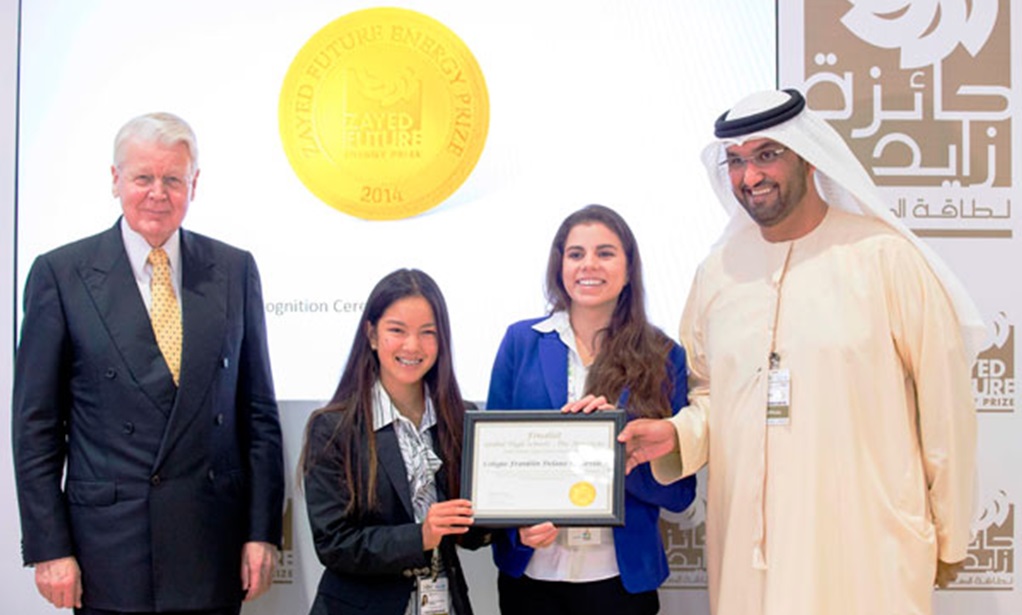President Ólafur Ragnar Grímsson of the Republic of Iceland, chair of the Zayed Future Energy Prize Jury and His Excellency Dr. Sultan Al Jaber, UAE Minister of State and director general of the Zayed Future Energy Prize, honour students of finalist Colegio Franklin Delano Roosevelt following 2014 awards ceremony
Abu Dhabi-UAE: 15 December, 2014 – His Excellency Dr Thani Ahmed Al Zeyoudi permanent representative of the UAE to the International Renewable Energy Agency (IRENA), Director of Energy and Climate Change at the UAE Ministry of Foreign Affairs and Vice Chair of the Zayed Future Energy Prize Review Committee, visited the 2014 and 2015 Zayed Future Energy Prize finalist high school - Colegio Franklin Delano Roosevelt in Lima, Peru - to assess the progress of the school’s mixed renewable energy project.
Her Highness Sheikha Fatima Bint Mubarak, Mother of the Nation, President of the General Women's Union, President of the Higher Family Development Foundation and Chairperson of the Supreme Council for Motherhood and Childhood, bestowed a generous donation to each of the five finalists of the Global High Schools category in January 2014.
Colegio Franklin Delano Roosevelt was among the five beneficiaries of the grant. The school’s grant winning proposal includes the implementation of solar-water heaters, solar panels and the on-site production of biofuels for their school bus.
During his visit to the school, Dr Al Zeyoudi attended a talk on climate change, arranged by the school for students of grades 11 and 12. Addressing the audience on climate change solutions were Maria van der Hoeven, Executive Director of the International Energy Agency, and Joseph Robertson, Global Strategy Director of the Citizen’s Climate Lobby.
Commenting on his visit to the school, Dr Al Zeyoudi said: “Through the Zayed Future Energy Prize, the UAE leadership is enabling young people around the world to experience the value of renewable energy and sustainability. The students of Colegio Franklin Delano Roosevelt are setting an example in their community by pursuing these environmental initiatives. Their commitment and enthusiasm is inspiring.”
Dr Al Zeyoudi led the UAE delegation to the United Nations COP20 Climate Change conference in Lima, Peru. From 1-12 December, the 12-day meeting invited representatives from almost 200 nations to finalise negotiations on an agreement to curb global carbon emissions. The UN will then seek to achieve a binding agreement between the international community at the COP21 UN Climate Change Conference in Le Bourget, Paris between November 30 and December 11, 2015.
“Delegates at the COP20 conference in Lima are discussing solutions to the global climate challenge. As we address issues that will affect the next generation, students here at Colegio Franklin Delano Roosevelt are taking responsibility and building upon the foundations we are now laying,” added Dr Al Zeyoudi.
Colegio Franklin Delano Roosevelt is among this year’s three finalists from the Americas in the Global High Schools category. The school’s current project proposal centres on a renewable energy-powered research lab, known as the Generating Energy Alternatives Research building or ‘GEAR Box’. In the lab, students will experiment with different energy and transport technologies. The initiative aims to inspire students to pursue careers in alternative energy.
The GEAR Box project will provide a place for students to develop practical skills in relation to renewable energy. The classrooms are expected to be almost entirely energy self-sufficient. The project was inspired by Abu Dhabi’s Masdar City and its pioneering work in energy conservation. The school’s vision to develop Peru’s significant natural resources for the wider benefit of the environment is the driving force behind the project.
Nearly 15 percent of the Peruvian population currently live without reliable electricity. The government plans to increase the electrification rate to 95 percent by 2016 through the deployment of solar technologies. The ‘National Photovoltaic Household Electrification Programme’ will facilitate the delivery of 150,000 solar PV systems to homes in remote areas of the country. Solar energy projects in Peru attracted more than US$400 million investment in 2011 and 2012.
The Zayed Future Energy Prize established the Global High Schools category in 2012 to fund projects that would accelerate the deployment of renewable energy and sustainability in schools around the world.
.svg?iar=0&hash=670E3638BC16C0DD69B262DD1184DEA8)


